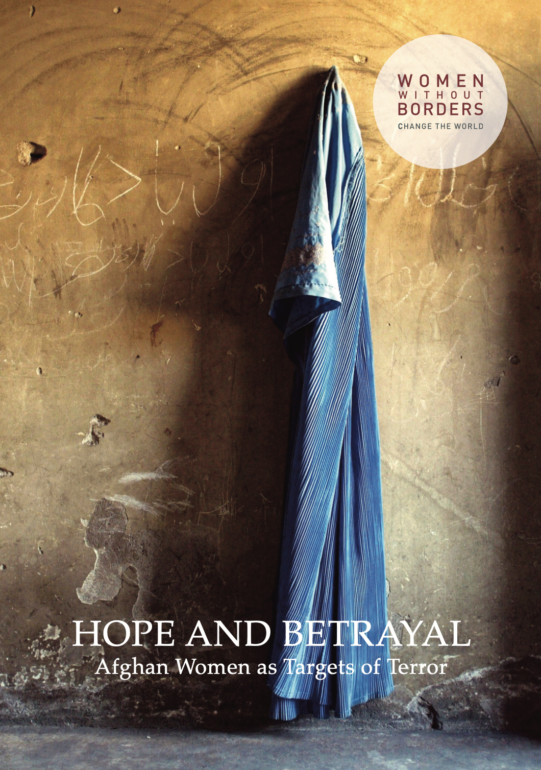The political instability that accompanied the fall of Saddam Hussein and the ensuing unsteady security situation in Iraq cast doubt on the future and life trajectories of the country’s youth. Women without Borders (WwB) responded by conducting a study with teenagers, parents, and teachers in Baghdad in order to outline their fears, perspectives, desires, and ideas, and to bring their perceptions and grievances to the attention of the world. The findings of the study were used to develop the handbook ‘Step by Step into the Future’, which formed the basis of workshops for both Iraqi teenagers and their teachers. WwB developed and ran a train-the-trainer workshop. The local trainers went on to engage some three thousand teenagers in these competence and confidence building workshops.
Political instability and a deteriorating security situation gravely impacted the youth of Iraq in the years following the overthrow of Saddam Hussein. The country’s tradition of secularism guaranteed a relatively egalitarian social model that placed education at the forefront. Yet many institutions of learning were destroyed and remained partially closed, adolescents tended to be confined to their homes for weeks on end as a consequence, and, more generally, the youth appeared to have lost direction.
With the support of the Austrian Federal Ministry of Labour, Social Affairs, and Consumer Protection (BMSK), Women without Borders (WwB) responded with a three-stage, action-oriented research project centring on Iraqi teenagers and their families. Between 2005 and 2006, WwB surveyed some 100 teenagers aged fifteen to eighteen and interviewed 55 parents and 15 teachers in Baghdad. In collaboration with local experts and partners on the ground, WwB explored the key challenges that the youth faced in this transitional period.
Parents, as the study revealed, feared that their sons had become easy targets for recruiters, and that they could get caught up in extremist groups. While boys were under pressure to adapt to new social norms that had yet to be defined, girls experienced increasing restrictions on their former freedoms of movement and public expression. The resulting psycho-social challenges added to the new generation’s prevailing feelings of uncertainty and isolation. Concurrently, parents tended to place the responsibility of creating a peaceful and democratic Iraq on their children without providing the necessary guidance, which further deepened the youth’s self-doubt. Fear, violent extremism, a lack of direction, and distrust were seriously impacting the lives of young Iraqis, but the participants also expressed a desire to guide their country into a peaceful era. Feelings of abandonment and a sense of being left to their own devices appeared to be having a dampening effect on the youth’s ability to conceptualise a way forward. In stark contrast to the teenagers, parents tended to be more confident about their children’s abilities. They felt confident that their children would be well educated, make a good living, be honest and independent, and build a better Iraq. Teachers, on the other hand, took note of worrying behavioural shifts among their students, including aggression, rebellion, and a loss of respect due to fear, psychological stress, and societal expectations.
Equipped with its research study insights, WwB invited three male and five female educators from different Iraqi organisations to Austria to contextualise and jointly develop both the handbook and accompanying DVD ‘Step by Step into the Future’. These resources focused on using action-oriented methods to deal with personal fears and frustrations and learn about coping mechanisms that can prove effective in times of social turmoil. These efforts led to the implementation of a series of workshops in which teenagers were brought together to explore their identity, self-confidence, and community resilience, and to build trust among participants. The workshop consisted of four modules covering the following topics: Exchange of experiences and feelings / recounting, sharing, trusting; Trust in me, trust in the group / sharing, describing, listening; The future in our hands / taking a position, focusing on a topic; Step by step / training, testing, practising. The workshops also functioned as a meeting place where they could channel their insecurities and doubts into concrete skills and action. The aim was not only to strive for individual empowerment and stabilisation, but also to lay the basic foundations for active participation in a democratic Iraq.
In response to the success of the workshops among teenagers, WwB designed a comprehensive training platform for Iraqi teachers so that they could further implement the ‘Step by Step into the Future’ lessons in their own classrooms and communities. WwB then convened two train-the-trainer workshops in Erbil and Sulaymaniyah, where an additional forty teachers received instruction. The educators showed excitement about the project, with one noting, ‘It’s the first time for me to participate in such a training. You discover yourself and the others, and this is so important—to find out what happens within ourselves and the others, and how we can transform this for the current situation of Iraq. It is exactly what Iraqi youth needs: to get to know themselves better, to improve themselves, and to actively participate in society’.
Through its study, corresponding handbook and DVD, and workshops for both young Iraqis and their teachers, WwB translated its research findings into action and contributed to encouraging the next generation of Iraqi citizens to go ‘Step by Step into the Future’. In the words of Manal Omar of Women to Women International, ‘Iraqis know exactly where they need to go but are in need of the tools and resources to get there. Trainings such as this provide unique tools and methods that Iraqis can take back with them to connect with their civil society in order to meet their goals.’ Over the course of this project, the organisation was able to engage three thousand teenagers, helping to provide them with a sense of direction and turn their hopes into lasting social change.

